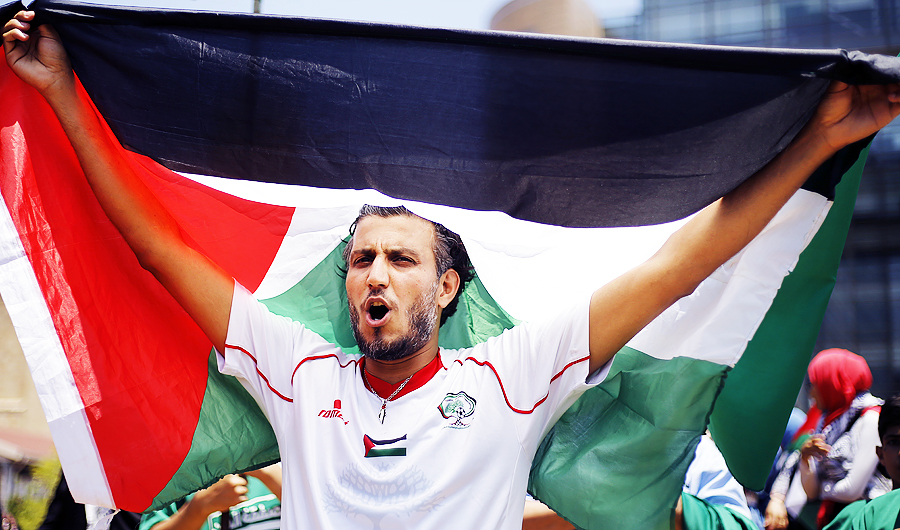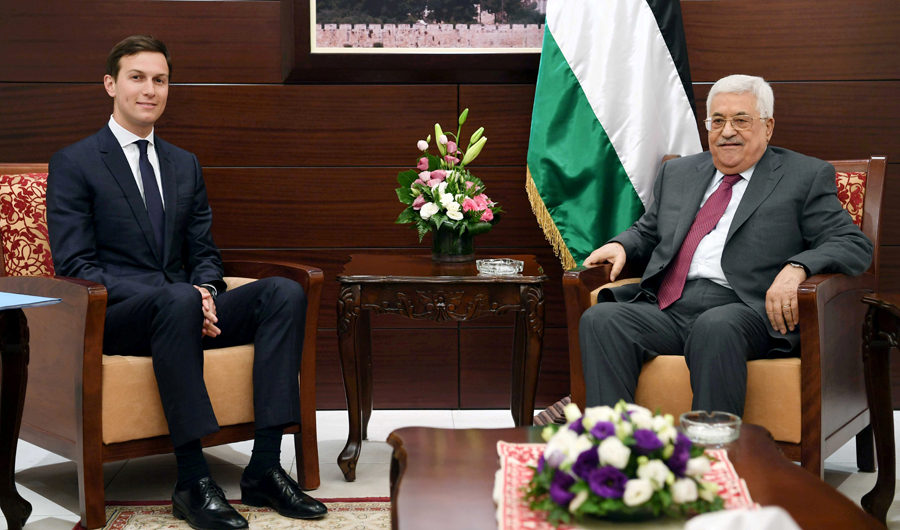Palestinian refugees reject US Mideast policy as Beirut skips meeting
BEIRUT: Palestinian refugees in Lebanese camps took to the streets on Tuesday to reject the so-called US “deal of the century,” burning US and Israeli flags and demanding the right to return, following the Bahrain workshop on the Palestinian issue.
Lebanon did not officially participate in the workshop despite hosting almost 200,000 Palestinian refugees, and Lebanese political and religious figures stressed their “rejection” of the policy of resettlement.
The chairman of the Lebanese-Palestinian Dialogue Committee, Dr. Hassan Mneimneh, told Arab News: “The US administration’s insistence on its respect for the Lebanese constitution, which rejects the resettlement of the Palestinians, has changed now in the light of statements made by Jared Kushner, senior advisor to US President Donald Trump, asserting that the Palestinians should stay in the host countries or seek a third country. This is a resettlement project.
“If this continues and the Americans succeed in imposing what they plan as a fait accompli, things will become worrying. We have seen what happened over sanctions on Iran — countries that refused to impose them were subjected to economic pressure.
“Lebanon cannot resettle the Palestinians on its land. This is a firm, official and popular position.”
BACKGROUND
The Grand Mufti of Lebanon, Sheikh Abdul Latif Derian, said that ‘Palestine is not a commodity that is sold and bought.’
Mneimneh said Lebanon would struggle to help Palestinians if more pressure was applied to the UN’s Relief and Works Agency for Palestinians in the Near East (UNRWA). The Trump administration suspended its share of the agency’s annual funding, now around $370 million, last year, and there are suggestions the US could veto UNRWA’s mandate, which will be resubmitted to the UN General Assembly in September. “This is a very dangerous sign, especially for Lebanon. The Lebanese authorities should look into all future possibilities in case things get worse,” Mneimneh added.
Protesters in the Ain Al-Hilweh camp, the largest in Lebanon, burned flags and tires in front of the Palestinian Joint Force headquarters to express their anger.
“The Palestinian issue is not for sale, and we will resist any attempt to liquidate it. We stand behind the Palestinian leadership headed by President Mahmoud Abbas,” said Maher Shabayta, secretary of the Palestinian Liberation Organization and Fatah Movement in Sidon.
“We will resist any capitulation suggested by the US administration,” said Abu Hussein Hamdan, a political relations official of the Popular Front for the Liberation of Palestine.
In Tyre, UNRWA schools were closed and Palestinian flags and banners condemning the “deal of the century” and the Bahrain workshop were raised.
Abdulmajid Awad, a Hamas official in Tyre, said: “The meeting in Manama is aimed at eliminating the Palestinian national cause and we are still committed to the right of return. Resistance must continue in all its forms.”
The Grand Mufti of Lebanon, Sheikh Abdul Latif Derian, said: “Palestine is not a commodity that is sold and bought. It is an issue that will be solved by the return of Palestinian people to land occupied by a brutal enemy. We say to whoever tries to lure our Arab countries with billions of dollars: Arab land, especially the land of blessed Palestine, is priceless and we will not accept resettlement.
“No one should dream that the Palestinians in the diaspora will be resettled — they will return to the Palestinian state with Jerusalem as its capital.”
The Beirut Bar Association (BBA) witnessed a rally of dozens of lawyers after they walked out of court hearings to protest. “The Manama workshop aims to eliminate the Palestinian issue, and the right of return of the refugees to their country,” said Jamil Qambris, secretary of the BBA.
The Lebanese-Palestinian Dialogue Committee is a Lebanese governmental advisory body, dealing with the governance of Palestinian refugees.
A census conducted by the Lebanese and Palestinian Central Bureau of Statistics in 2017 showed that over 78,000 Palestinian refugees based in the country live in camps.

Kushner urges Palestinians to take the “Opportunity of the Century”Why Palestine needs help



